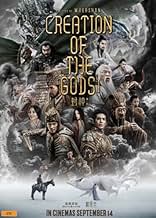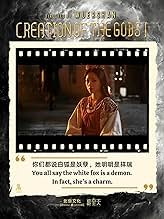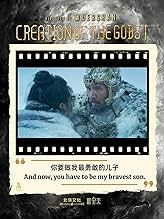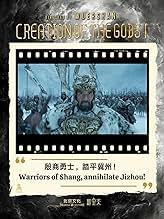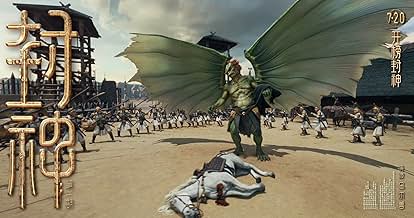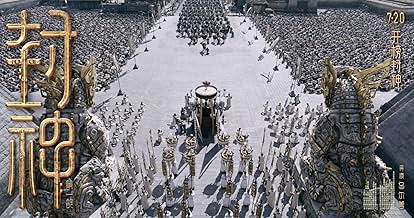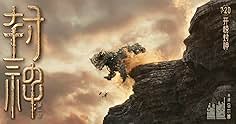AVALIAÇÃO DA IMDb
6,7/10
5,8 mil
SUA AVALIAÇÃO
Um magnífico épico de alta fantasia oriental que recria as prolongadas guerras míticas entre humanos, imortais e monstros, que aconteceram há mais de três mil anos.Um magnífico épico de alta fantasia oriental que recria as prolongadas guerras míticas entre humanos, imortais e monstros, que aconteceram há mais de três mil anos.Um magnífico épico de alta fantasia oriental que recria as prolongadas guerras míticas entre humanos, imortais e monstros, que aconteceram há mais de três mil anos.
- Prêmios
- 45 vitórias e 45 indicações no total
Kris Phillips
- King Zhou
- (as Hsiang Fei)
Chen Muchi
- Yin Jiao
- (as Muchi Chen)
Avaliações em destaque
An absolutely needed movie for Chinese cinematography. Surprisingly edgy and mystical that makes one wonder how did it ever pass the "bar". Many scenes reminded me of the Red Wedding from Game of Thrones, and indeed as many lauded, this could very well be the Chinese version of GOT or Lord of the Rings. At the same time, the film has so many things that is so distinctly Chinese in terms of its value system and culture. No doubt, I hope the sequels gets the green light, as these films could really push our culture and stories forward to a larger stage. Only gripe is that there is still a sense of awkwardness in some of the acting, most specifically with the King. Nevertheless, it is still one of the greatest villains I've seen in a Chinese film and the casting of the younger actors are fantastic, finally some masculinity again!
Absolutely a fantastic movie, the storyline, the acting, the virtual images, the music all made this movie an Epic movie.
Let me talk about the conclusion first: this is the best mythical epic movie in China!
As a fan who read Fengshen Yanyi at the age of seven and re-read the original novel countless times in more than 20 years, I can say responsibly that this movie is definitely not a magic reform! On the contrary, it is the first masterpiece among all film and television adaptations.
Some passages that seem magical at first glance are actually well-founded, and they are the optimal solution after careful research and selection. The adaptation of the movie is very good.
This new story from a contemporary perspective can be called a divine script. It is seamless from beginning to end, and echoes before and after the transition.
Can't wait for the 2nd one!! Highly recommend to everyone!
Let me talk about the conclusion first: this is the best mythical epic movie in China!
As a fan who read Fengshen Yanyi at the age of seven and re-read the original novel countless times in more than 20 years, I can say responsibly that this movie is definitely not a magic reform! On the contrary, it is the first masterpiece among all film and television adaptations.
Some passages that seem magical at first glance are actually well-founded, and they are the optimal solution after careful research and selection. The adaptation of the movie is very good.
This new story from a contemporary perspective can be called a divine script. It is seamless from beginning to end, and echoes before and after the transition.
Can't wait for the 2nd one!! Highly recommend to everyone!
The original novel was published 400 years ago and have too many memorable moments. So it is very unsuitable for movie use. Moreover, Chinese classical novels, especially this type of novels, (hua beng) do not have the sublimation of characters in modern Western novels, so they are not necessarily suitable for movies. So the director made simplifications and trade-offs here. Many familiar scenes have not been retained. The perspective of the movie is abandoned and the change of a character is the most important driving force for the movie. The visuals have improved a lot. It is already very good to have such a performance.
Chinese mythological epics are rare - mainly because cast of characters and their relationships to mystical themes can be overwhelming. Lots of characters and events compete with waning audience attention.
It's surprising how satisfying the film is. There's battles galore, assisted by the support of abundant CGI in nearly every frame; some effects worked (the battles) while others didn't (the flying fox spirit), while a visit to the realm of the immortals was disappointing. While the story itself was irregularly paced, I found it more absorbing than, say, LOTR, and you can't deny that Chinese mythology has never been rendered as well as this film.
There's loud instrumental music from start to finish, with plenty of fights to keep your attention. The sincerity of the narrative is balanced by an amusing trio of spirits who try to prop up a failing Shang dynasty. It's really a miracle of sorts that the narrative coheres so well.
It's surprising how satisfying the film is. There's battles galore, assisted by the support of abundant CGI in nearly every frame; some effects worked (the battles) while others didn't (the flying fox spirit), while a visit to the realm of the immortals was disappointing. While the story itself was irregularly paced, I found it more absorbing than, say, LOTR, and you can't deny that Chinese mythology has never been rendered as well as this film.
There's loud instrumental music from start to finish, with plenty of fights to keep your attention. The sincerity of the narrative is balanced by an amusing trio of spirits who try to prop up a failing Shang dynasty. It's really a miracle of sorts that the narrative coheres so well.
If you're not put off by subtitles, any fan of war films and heroic fantasy should watch this. Though it seems odd they haven't done an English-dubbed version, which would get it through to a much wider audience.
They could also try a different title. Maybe Superheroes of the Fall of the Shang Dynasty. For Chinese and other East Asians, the idea of mortals becoming gods is familiar and believed by the religious or superstitious. A belief also found in Classical Greece, but confusing for a Western audience.
It is an heroic fantasy, loosely based on the actual fall of the Shang, 3000 years ago. A concubine who was widely blamed in later histories is re-invented as a Fox Demon - another concept unfamiliar in the West. And it is actually simplified from the original legend, which has three spirits sent by an offended goddess to be destructive concubines who made a bad man worse.
Which may be no more historic than Shakespeare's Macbeth, but certainly makes a good drama.
It seems this legend is even better known than Journey to the West / Monkey, which is much better known in the West and had a recent much-rewritten film, as well as a Japanese television series that was popular in the West with dubbing into English. As I said, maybe humans become gods is too odd in the Western view, though the very popular superheroes are essentially the same.
The plot is complex, and I found the palace guards confusingly similar. But it was entertaining, and is the first of three.
They could also try a different title. Maybe Superheroes of the Fall of the Shang Dynasty. For Chinese and other East Asians, the idea of mortals becoming gods is familiar and believed by the religious or superstitious. A belief also found in Classical Greece, but confusing for a Western audience.
It is an heroic fantasy, loosely based on the actual fall of the Shang, 3000 years ago. A concubine who was widely blamed in later histories is re-invented as a Fox Demon - another concept unfamiliar in the West. And it is actually simplified from the original legend, which has three spirits sent by an offended goddess to be destructive concubines who made a bad man worse.
Which may be no more historic than Shakespeare's Macbeth, but certainly makes a good drama.
It seems this legend is even better known than Journey to the West / Monkey, which is much better known in the West and had a recent much-rewritten film, as well as a Japanese television series that was popular in the West with dubbing into English. As I said, maybe humans become gods is too odd in the Western view, though the very popular superheroes are essentially the same.
The plot is complex, and I found the palace guards confusingly similar. But it was entertaining, and is the first of three.
Você sabia?
- CuriosidadesThe trilogy is Loosely based on the classical fantasy novel "Investiture of the Gods" (Fengshen Yanyi) by Zhonglin Xu and Xixing Lu, which is one of the only two mythical epics in Chinese literature history that originated from real historical events, and was greatly enriched and fabricated with vast imagination and fiction, when it was passed down the generations by storytellers over the last two thousand years, and finally became a classic. All materials came from local Chinese history and culture. It is arguably the No.1 mythical fiction of China.
- ConexõesFollowed by Feng Shen 2: Zhan huo Xi qi (2025)
Principais escolhas
Faça login para avaliar e ver a lista de recomendações personalizadas
- How long is Creation of the Gods I: Kingdom of Storms?Fornecido pela Alexa
Detalhes
- Data de lançamento
- País de origem
- Centrais de atendimento oficiais
- Idiomas
- Também conhecido como
- Creation of the Gods I: Kingdom of Storms
- Locações de filme
- Empresas de produção
- Consulte mais créditos da empresa na IMDbPro
Bilheteria
- Orçamento
- CN¥ 800.000.000 (estimativa)
- Faturamento bruto nos EUA e Canadá
- US$ 1.706.355
- Fim de semana de estreia nos EUA e Canadá
- US$ 931.140
- 24 de set. de 2023
- Faturamento bruto mundial
- US$ 373.021.923
- Tempo de duração2 horas 28 minutos
- Cor
- Mixagem de som
- Proporção
- 1.85 : 1
Contribua para esta página
Sugerir uma alteração ou adicionar conteúdo ausente

Principal brecha
What is the Canadian French language plot outline for Feng Shen 1: Zhaoge Feng Yun (2023)?
Responda
![Assistir a Trailer [OV]](https://m.media-amazon.com/images/M/MV5BODg3MDJlY2ItODg5YS00ODkxLWJhNjMtNjgzNGYzYmE5NWU4XkEyXkFqcGdeQXRyYW5zY29kZS13b3JrZmxvdw@@._V1_QL75_UX500_CR0)
![Teaser [OV]](https://m.media-amazon.com/images/M/MV5BNzgwODFhNGMtMjEwYS00ZTYzLThmMGYtMTA2YWViOWE5MWNlXkEyXkFqcGdeQXRyYW5zY29kZS13b3JrZmxvdw@@._V1_QL75_UY281_CR10)
